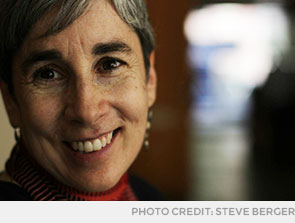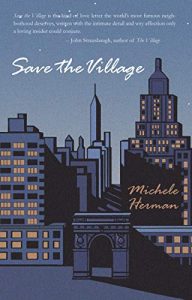When Did You Know You Were a Writer?
When Did You Know You Were a Writer?
by Michele Herman

Photo credit Steve Berger
The publication of my first novel, Save the Village (Regal House), earlier this year has led to my doing several online q&a’s. Usually there’s a question like “Q: When did you know you wanted to be a writer?” or the similar and yet entirely different “Q: When did you know you were a writer?” The answer is complicated.
A: As a child I couldn’t conceive of writing a book any more than I could conceive of climbing a mountain range. But words were pebbles on the pavement, crab grass tickling my calves, Long Island Sound seaweed wound around my ankles: free, plentiful, ready to hand, multihued, willing to be studied, stroked, poked, sniffed, slipped into the space between my side-by-side thumbs and whistled through.
A: I loved the names that families called things — the history, invention and sense of belonging these names held. The local “yard goods” store where my mother was forever taking us to buy “notions” was “Glorious Fabrics,” but we called it “Lock-up” because when my sister was still small we could plunk her in the fenced-in corner with the Fisher Price toys. My father’s best friend was Abe, but for reasons unknown to anyone still living we called him Big Charlie and he called us both Little Charlie. At some point, probably when I started taking French in seventh grade, my sister and I stopped saying “what a pain” and started saying “what a peigne.”
A: When I was young I made up the word “plurshtyha” (PLURSH-tee-ha), which I’ve never tried to write down before. (I see that it sounds much better than it looks.) It means soft and pleasing to the touch, something you can sink your fingers into. Plurshty for short. It became part of the lexicon in my family. My husband uses it too. I also made up the word “harshtalega” (HARSH-ta-league-ah) but I don’t remember what it means.
A: Once at the mall in Trumbull, Connecticut, my family came upon a bargain bin of socks at the cheapo anchor store E.J. Korvette, itself a marvel of a name as explained to me by my father, who knew such worldly things: it was code for Eight Jewish Korean Veterans. I just looked it up and this tale turns out not to be true, but what is true is that the E. stands for Eugene, which happens to have been my father’s name. Back to the bin. Each pair of socks had a sticker marked “irregular.” Because these socks had been pawed over pretty thoroughly, one of the pairs had lost both edges of its sticker and it read simply “gula.” For the next 15 years or so, until my father’s early death, we called anything irregular a “gula” (with a long u).
A: One winter dusk, my sister and I were hanging around in our parents’ bedroom. My father asked her to close the drapes, and my sister replied: “What do you think I am, a mommy?” Thereafter when they wanted one of us to close the drapes, they’d say “Be a mommy.”
A: In one of our Language Arts textbooks this sentence appeared: You can lead the band. The lesson was to say the sentence aloud five times, each time putting the emphasis on a different word. My sister and I did this endlessly, and sometimes in idle moments I still do it in my head, just for the pleasure of hearing the meaning change.
A: In 1972 my father gave me a spare Day at a Glance calendar, the kind with a pebbly black cover and slots for meetings each hour of the workday. I opened a purple Flair and made my first diary entry. The book sits on the bookshelf by my desk along with dozens of successors. It took many years for the emphasis to shift from the diet-obsessed and the lovelorn to the literary.
A: When I learned the term “inferiority complex,” I thought it explained everything.
A: Kids who didn’t pay attention to details drove me nuts.
A: Once at a bar in my hometown I scared a guy whose name I didn’t know and who had no idea who I was, when I said: you used to walk home after school along Wolfpit Avenue wearing a white t-shirt that said ADIDAS across the front. I hardly dared imagine I might one day put this skill to better use.
A: I was frightened of a lot of people, but I never feared even the most withering English teachers, not the one in seventh grade who looked at us over her half-glasses and used the expression “what have you” and made us diagram sentences. Not even the one my senior year of high school with enunciation and a demeanor like Bette Davis on the warpath, she who spent an entire class humiliating us by having us take stabs at what made the slim novel A Day in the Life of Ivan Denisovich a great book. (A: the extreme coolness and compression of the narration)
A: The first time I heard the pop song “I Really Want to See You Tonight” on the radio, I got excited by the refrain, which I heard this way: I’m not talking about the millennium, and I don’t want to change your life, but there’s a warm wind blowing the stars around, and I really want to see you tonight. I was crestfallen to learn how mundane the words actually are: I’m not talking about moving in, and I don’t want to change your life, but there’s a warm wind blowing, the stars are out, and I really want to see you tonight.
A: Maybe you’ve taken The New York Times quiz, the one that pinpoints the region where you grew up based on your answers to a multiple-choice quiz about what you call things that I call sprinkles, seltzer, median, rotaries. I love this quiz and take it anew every couple of years. It nails me every time: the southern Connecticut portion of the tristate area.
A: When I became (of course) a high school English teacher I assigned my freshmen the story “I Stand Here Ironing” by Tillie Olsen, about a poor single mother whose talented daughter who may not live up to her potential. Many decades later I still pull it off the shelf every couple of years and read it, tears running down my face.
A: I didn’t have the nerve to take a creative writing class in college until my senior year, and then, one day after I got some positive feedback from the professor, I was walking through the quad outside the student center. It was late winter in upstate New York and my boots sank in the mud and the sun was sharp in my eyes, and I felt happier and more hopeful than I’d ever felt before.
A: To end at the beginning, when my sister and I were very very small and sitting in the back seat of my father’s car, I got her to chant this ditty of mine: “Chocks and Cheerios go together.” And it was true – Chocks and Cheerios DO go together, in more ways than one. I was already a writer, though if someone had suggested as much, I wouldn’t have believed it.
—
Michele Herman is the author of the novel Save the Village and two poetry chapbooks, Just Another Jack: The Private Lives of Nursery Rhymes and Victory Boulevard. Her poems, stories and essays have appeared widely in journals including Ploughshares, The Sun and The Hudson Review. She’s a longtime teacher at The Writers Studio, a developmental editor, and an award-winning columnist for The Villager and The Village Sun.
https://www.facebook.com/Michele-Hermans-author-page-101856098125541
https://www.linkedin.com/in/michele-herman-63b7aa3/recent-activity/shares/
https://twitter.com/MicheleHHerman
https://www.regalhousepublishing.com/product/save-the-village/
SAVE THE VILLAGE
BUY HERE
Category: On Writing

























